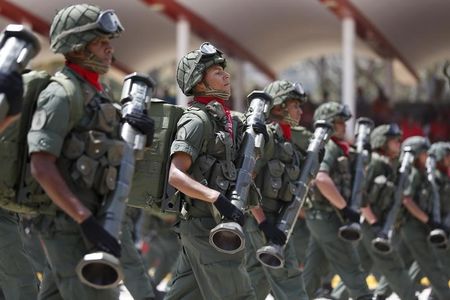By Louis Charbonneau and Patricia Zengerle
UNITED NATIONS/WASHINGTON (Reuters) - The United States will not stand in the way of Venezuela securing a temporary seat on the U.N. Security Council in 2015-16 after Latin American and Caribbean states unanimously endorsed its bid, U.N. diplomats and U.S. sources say.
The U.S. stance is in sharp contrast to its position in 2006, when Washington successfully campaigned against Venezuela's drive to join the 15-nation council, the only United Nations body that can authorize sanctions or military force. At that time, Venezuela failed to secure the requisite two-thirds majority of votes in the General Assembly for its bid after dozens of rounds of secret-ballot voting.
The U.S. campaign against Venezuela came after late President Hugo Chavez compared former U.S. President George W. Bush to the devil, saying on the podium of the 2006 General Assembly in New York that he could still "smell sulfur" a day after Bush addressed member states.
Campaigns intended to block countries' aspirations to join important U.N. bodies are not uncommon. Washington was also among the countries that lobbied last year to block Iran's and Syria's ambitions to join the Human Rights Council in Geneva. Both withdrew from the race.
But things are different this year. Venezuela is unopposed in its regional group and is set to join the council for the next two years providing it can secure the required two-thirds majority of votes in the 193-nation General Assembly when the election is held in October.
A senior U.S. congressional aide said Washington was not going to make an effort to keep Venezuela off the council. "People are resigned to it," the aide said. U.N. diplomats and other U.S. sources also said there was no U.S. campaign.
Washington, however, is clearly unhappy with the idea of Venezuela joining the Security Council, which has the task of overseeing international peace and security.
"Regional groups have a responsibility to put forward candidate countries that support the principles of the U.N. Charter, contribute to the Security Council's role in maintaining international peace and security, and uphold and advance human rights," said Kurtis Cooper, deputy spokesman for the U.S. mission to the United Nations.
"Our concerns with regard to Venezuela's record on human rights and democratic governance are well known," Cooper added. He declined to comment on any diplomatic discussions that might be going on behind the scenes.
Accusing Venezuelan officials of abuses in a crackdown on recent protests against Chavez's successor, President Nicolas Maduro, Washington has barred some Venezuelan government ministers and presidential advisers from entering the United States.
Venezuela will likely use the council seat as a platform to aggressively back allies such as Syria and Russia in their diplomatic wrangling with the United States, part of its broader effort to continue the anti-Washington foreign policy of late socialist leader Chavez.
It has even named the Chavez's daughter, Maria Gabriela Chavez, as its alternate ambassador to the United Nations.
The OPEC nation of 29 million has consistently opposed U.S. diplomatic initiatives. It backed Russia's annexation of the Crimean Peninsula, which was formerly part of Ukraine, and it provided fuel to Syria amid its battle against insurgents. Venezuela has also built up cooperative ties with Iran despite strict sanctions imposed by Western nations.
While the Latin American and Caribbean group's endorsement of Venezuela was already known, it was unclear until now whether the U.S. delegation would lobby hard against Caracas.
Venezuela's U.N. mission did not respond immediately to a request for comment. An official at Venezuela's foreign ministry in Caracas said no one was immediately available to comment.
Some in Washington are unhappy about U.S. inaction on Venezuela's bid.
Florida Republican Senator Marco Rubio, one of the leading critics of the Caracas government in the U.S. Congress, called it "shameful" that President Barack Obama's administration had not stepped in to keep Venezuela off the Security Council.

Rubio has been calling for legislation imposing sanctions on Venezuelans who inflict human rights violations on peaceful demonstrators against the government.
(Additional reporting by Brian Ellsworth in Caracas; Editing by Peter Galloway)
